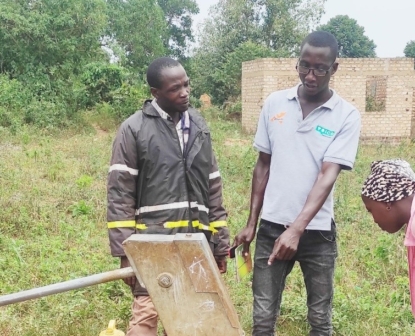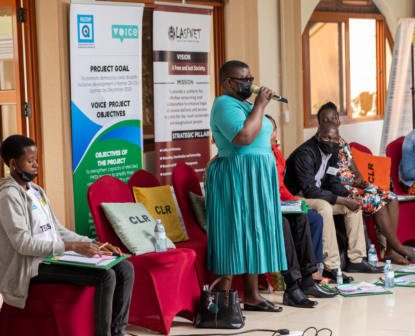Project
Doors will open for fisherfolk
-
Amount Funded
170,000 EUROProject Duration
01 Jan 2022 - 31 Dec 2023 -
-
Lead organisation
Joy Initiatives Uganda (JOYI),
-
Joy Initiatives Uganda (JOYI), is a women-led Local NGO legally registered with the National NGO Board to operate countrywide. The organization was established in 2008, with an original name Joint Efforts for Youth Uganda as a CBO operating in Mpigi District. JOYI was started with an aim of improving lives of young people, youth and women. JOYI Uganda’s formation came after witnessing gender inequalities and ignorance, poverty and and intense segregation.
-
Organisation
Joy Initiatives Uganda (JOYI), is a women-led Local NGO legally registered with the National NGO Board to operate countrywide. The organization was established in 2008, with an original name Joint Efforts for Youth Uganda as a CBO operating in Mpigi District. JOYI was started with an aim of improving lives of young people, youth and women. JOYI Uganda’s formation came after witnessing gender inequalities and ignorance, poverty and and intense segregation.
-
Project
“Doors will open for fisherfolk self-led youths” aims at strengthening fisherfolk youth participation to influence local government decision for improved social services, health and education in the fishing communities. The project will be implemented inMpigi District’s fishing community sub-counties of Kammengo and Buwama. The project objective: To ensure the interface between the fishing folk youth and their elected leaders so that there is an effective representation of the issues pertaining to the hard-to-reach youth in the fishing areas.
In Uganda, the decentralization policy demands that decisions and policymaking should be a bottom-up process. However, the challenge is this: most decisions from lower local government to national level are being madeby a few elites of the political and technocrats. This has created a large section of dissatisfied, disempowered and apathetic fisherfolk. Poor governance in social sectors has led to the inefficient and inadequate delivery of social services; poor supervision; increased corruption; and lack of accountability to citizens. A such a situation the marginalized majority, who are the women and youth suffer most following unsatisfactory planning and budgeting for vulnerable groups interests.In the recent Mpigi District scorecard assessment report 2018/19 conducted by ACODE (https://www.acode-u.org/uploadedFiles/Mpigi2018-19.pdf), the district was hailed as one of the best performers. However, failure by councilors that represent special interest groups(women, youth, PWDs, older persons) to monitor the delivery of public/social services was noted as a key factor affecting performance. Worse still, the rights holders “women and youth” are unaware of their civil, social and economic rights, ignorant of the laws, policies and programmes;- as a result, they lack the capacity to articulate them or influence their enforcement. Hence women and youth fail to engage local governments for accountability. This is why there is an urgent need for women to amplify voices to influence duty bearers for what is due to them.
JOYI will employ capacity building, engagement, information sharing, communication and advocacy strategies to empower rights holders to influence informeddecisions by duty bearers.
The District is divided into one county with six rural Sub-counties, one Town Council, a total population of 251512 persons- 125314 male and 126198 female (National Census 2014). The “3Ws” project targets Kammengo sub-county with a 38290 people (19456 male and 18834female) in 8 parishes, including Buyiga Island. While Buwama sub-county with 50273 people with25228 male and 25045 female distributed in 10 parishes, including landing sites.
Fisherfolk youth will be at the centre of their own grassroots advocacy. Women and youth including those with disabilities from village, parish, sub-county to district level will reach out to those with responsibility over decision making in the local government context; facilitate dialogues among duty bearers and rights holders to influence participatory decisions making; engaging women and youth in lobbying and advocacy activities as well as building the capacity of the newly elected special interest group leaders/councilor in Local government planning so as to influence decisions and budget allocations towards effective service delivery for their constituencies.
-
-
“Doors will open for fisherfolk self-led youths” aims at strengthening fisherfolk youth participation to influence local government decision for improved social services, health and education in the fishing communities. The project will be implemented inMpigi District’s fishing community sub-counties of Kammengo and Buwama. The project objective: To ensure the interface between the fishing folk youth and their elected leaders so that there is an effective representation of the issues pertaining to the hard-to-reach youth in the fishing areas.
In Uganda, the decentralization policy demands that decisions and policymaking should be a bottom-up process. However, the challenge is this: most decisions from lower local government to national level are being madeby a few elites of the political and technocrats. This has created a large section of dissatisfied, disempowered and apathetic fisherfolk. Poor governance in social sectors has led to the inefficient and inadequate delivery of social services; poor supervision; increased corruption; and lack of accountability to citizens. A such a situation the marginalized majority, who are the women and youth suffer most following unsatisfactory planning and budgeting for vulnerable groups interests.In the recent Mpigi District scorecard assessment report 2018/19 conducted by ACODE (https://www.acode-u.org/uploadedFiles/Mpigi2018-19.pdf), the district was hailed as one of the best performers. However, failure by councilors that represent special interest groups(women, youth, PWDs, older persons) to monitor the delivery of public/social services was noted as a key factor affecting performance. Worse still, the rights holders “women and youth” are unaware of their civil, social and economic rights, ignorant of the laws, policies and programmes;- as a result, they lack the capacity to articulate them or influence their enforcement. Hence women and youth fail to engage local governments for accountability. This is why there is an urgent need for women to amplify voices to influence duty bearers for what is due to them.
JOYI will employ capacity building, engagement, information sharing, communication and advocacy strategies to empower rights holders to influence informeddecisions by duty bearers.
The District is divided into one county with six rural Sub-counties, one Town Council, a total population of 251512 persons- 125314 male and 126198 female (National Census 2014). The “3Ws” project targets Kammengo sub-county with a 38290 people (19456 male and 18834female) in 8 parishes, including Buyiga Island. While Buwama sub-county with 50273 people with25228 male and 25045 female distributed in 10 parishes, including landing sites.
Fisherfolk youth will be at the centre of their own grassroots advocacy. Women and youth including those with disabilities from village, parish, sub-county to district level will reach out to those with responsibility over decision making in the local government context; facilitate dialogues among duty bearers and rights holders to influence participatory decisions making; engaging women and youth in lobbying and advocacy activities as well as building the capacity of the newly elected special interest group leaders/councilor in Local government planning so as to influence decisions and budget allocations towards effective service delivery for their constituencies. -
News




